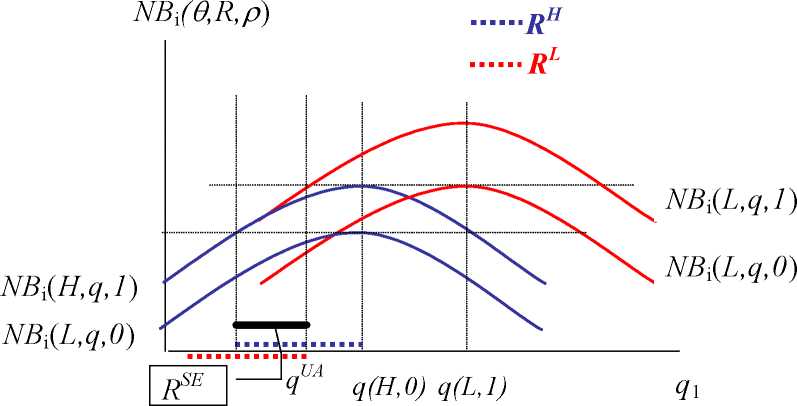Result 1: A separating equilibrium exists, if there exists a qi' < qi(H,0), such
' _ . . ..... . ' _ . . .....
thatNBi(H,q'i,0)-NBi(H,q(L,1),1)>NBi(L,q'i,0)-NBi(L,q(L,1),1)
Proof, see appendix 2.
The necessary condition says that it must be less costly for the high cost type
than for the low cost type to decrease reductions below qi(H,0) defined by the
condition in result 1. In this way it resembles a sorting condition well-known
form the signalling literature. Figure 3 explains this condition. Typically, the set
of separating equilibrium outcomes is large, and this shortcoming will be dealt
with now by introducing equilibrium refinements.
Figure 3. The set of separating equilibrium outcomes

Equilibrium refinements used for signalling games are based on the notion of
forward induction, which asserts that when rational players enter a game, they
should, in evaluating strategies, reason from the beginning of the game-tree by
using introspection, i.e., by examining who has an incentive to send possible
out-of-equilibrium messages, and then revise beliefs accordingly. Given that it
is common knowledge among the players that everyone engages in this intro-
spection process, an implicit communication emerges. To see how refinements
based on this idea work, imagine that a player picks a candidate equilibrium
20
More intriguing information
1. An Estimated DSGE Model of the Indian Economy.2. FISCAL CONSOLIDATION AND DECENTRALISATION: A TALE OF TWO TIERS
3. Quelles politiques de développement durable au Mali et à Madagascar ?
4. The name is absent
5. Popular Conceptions of Nationhood in Old and New European
6. Top-Down Mass Analysis of Protein Tyrosine Nitration: Comparison of Electron Capture Dissociation with “Slow-Heating” Tandem Mass Spectrometry Methods
7. Ex post analysis of the regional impacts of major infrastructure: the Channel Tunnel 10 years on.
8. Ongoing Emergence: A Core Concept in Epigenetic Robotics
9. Critical Race Theory and Education: Racism and antiracism in educational theory and praxis David Gillborn*
10. Secondary stress in Brazilian Portuguese: the interplay between production and perception studies